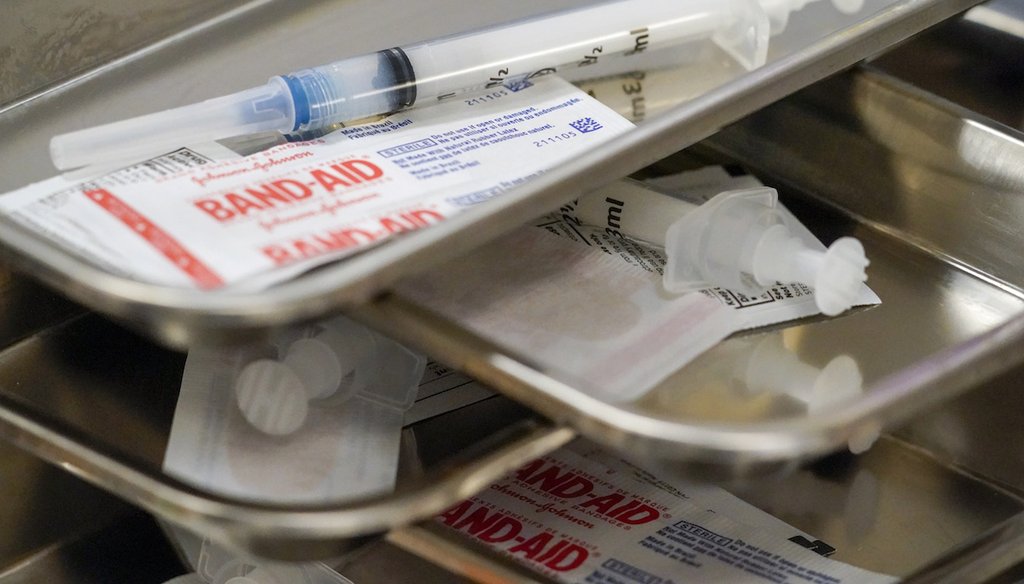



In this March 18, 2021 file photo, syringes are filled with the Moderna COVID-19 vaccine at a pop-up site in New York. (AP)
There is no evidence COVID-19 vaccination causes RSV in children, according to the Centers for Disease Control and Prevention. The agency said a recent increase in cases of respiratory syncytial virus is likely because of a relaxation of widespread mitigation measures.
There is no COVID-19 vaccine authorized for children younger than 6 months old, and that age group continues to have the highest rates of RSV hospitalization, according to the CDC.
Social media users are wrongly linking a rise in cases of respiratory syncytial virus, or RSV, in young children to the COVID-19 vaccine.
"Gov injects children & pregnant women with experimental c jab——> RSV is an adverse event of said jab——> Pediatric RSV cases surge at record highs," reads one Instagram post.
Another post says, "Moderna/Pfizer’s C19-V clinical trials involving children identified elevated rate of Respiratory Syncytial Virus (RSV). FDA’s vaccine committee even voiced concerns. RSV now spiking in children. CDC’s befuddling advice on RSV is to recommend more C19-V."
These posts were flagged as part of Facebook’s efforts to combat false news and misinformation on its News Feed. (Read more about our partnership with Meta, which owns Facebook and Instagram.)
RSV is a common respiratory virus that causes mild, cold-like symptoms, but it can cause serious infection in infants and older adults.
There is no evidence that COVID-19 vaccination can cause infection with RSV, said Katie Grusich, a spokesperson for the Centers for Disease Control and Prevention.
"Although the U.S. has seen a recent resurgence in the circulation of RSV, flu, and other respiratory viral diseases, this is not linked to pediatric COVID-19 vaccination — but likely because of a relaxation of widespread mitigation measures," Grusich said.
As people congregate after a period of separation, it’s not surprising to see an increase in respiratory disease circulation, she said. Also, efforts in 2020 and 2021 to prevent the spread of respiratory diseases — such as school closures and masking — led to atypical flu and RSV seasons, where fewer children were exposed to the viruses
The claim also doesn’t take into account who is eligible to receive COVID-19 vaccines and who is most vulnerable to RSV. There is no COVID-19 vaccine authorized for children younger than 6 months old, and these infants have always been at the highest risk of RSV-associated severe disease and hospitalization. Children younger than 6 months old continue to have the highest rates of RSV hospitalization among all age groups, Grusich said.
Dr. Thomas A. Russo, who treats patients and also studies infectious diseases at the University at Buffalo, echoed the point that there is no evidence that COVID-19 vaccination is causing RSV.
Pandemic lockdowns prevented young kids from being exposed to RSV, which means they didn’t develop antibodies to the disease, he said. There are now more susceptible children than there had been in the past, because fewer had been exposed to the disease in the last two years.
Some of the social media claims point to a document from the U.S. Food and Drug Administration about the Moderna vaccine’s trial in children ages 6 months to 5 years old. The document states that within 28 days of vaccination, there were some respiratory infections — including croup, RSV and pneumonia — found with greater frequency in the trial group.
The document says for children ages 2 through 5, RSV was reported by 0.4% who got the vaccine, and less than 0.1% of those who received the placebo. In children ages 6 months to two years, RSV was found in 0.8% of the group that received the vaccine and 0.5% of placebo recipients.
However, investigators determined that the cases of severe RSV were not related to the vaccine. The FDA agreed with the trial investigator's assessment that it is unlikely there is a causal association between respiratory infections and the vaccine. The FDA said the imbalance could be due to chance.
"FDA continues to closely monitor for safety signals and has not identified a safety signal for RSV after administration of COVID-19 vaccine," said Abigail Capobianco, an FDA spokesperson.
Other fact checkers said the claims rely on a misreading of the clinical trial data, and that the numbers of children affected by RSV in the trial group and the placebo group were each very small.
Social media posts say increases in RSV in children are linked to the COVID-19 vaccine.
There is no evidence COVID-19 vaccination causes RSV in children. The CDC said the increase in RSV cases is likely because of a relaxation of widespread mitigation measures.
There is no COVID-19 vaccine authorized for children younger than 6 months old, and that age group continues to have the highest rates of RSV hospitalization.
The FDA has found no link between RSV cases and COVID-19 vaccines.
We rate this claim False.
Instagram post, user @ktdgreen, Nov. 13, 2022.
Instagram post, user @bloeppke, Nov. 11, 2022.
AFP Fact-check, "Covid-19 vaccination does not increase risk of RSV infection," Nov. 14, 2022.
Email interview, Kate Grusich, CDC Public Affairs, Nov. 16, 2022.
Phone interview, Thomas A. Russo, MD, SUNY distinguished professor, professor and chief, infectious disease, Jacobs School of Medicine and Biomedical Sciences, University at Buffalo, Nov. 17, 2022.
FDA.gov, Emergency Use Authorization Amendment for an Unapproved Product Review Memorandum, sponsor: ModernaTX, June 16, 2022.
U.S. Centers for Disease Control and Prevention, COVID Data Tracker, "COVID Vaccinations in the United States," updated Nov. 16, 2022.
Email interview, Abby Capobianco, spokesperson, U.S. Food and Drug Administration, Nov. 21, 2022.
In a world of wild talk and fake news, help us stand up for the facts.
